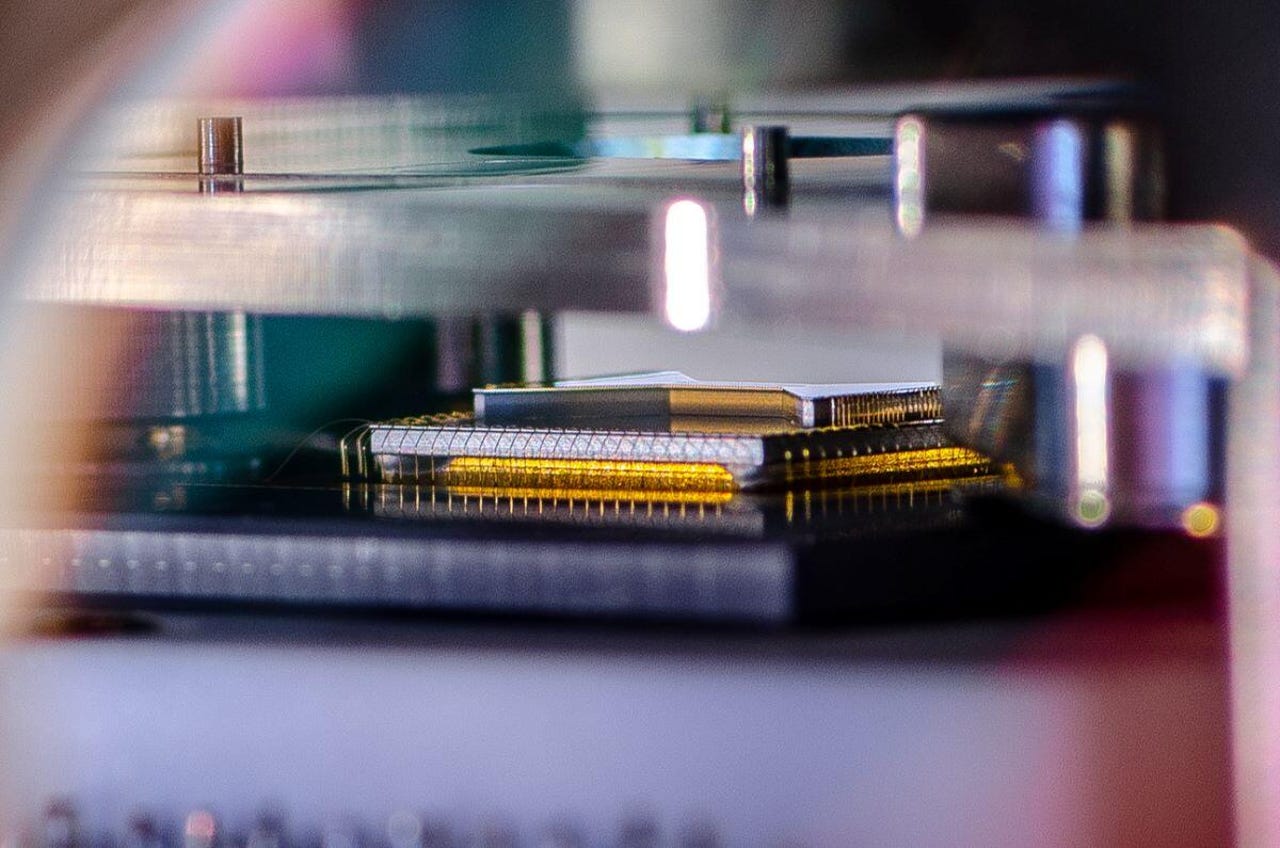
































The partnership will see IonQ and Accenture join forces to help other businesses assess how quantum computing could help improve their outcomes.
Image: IonQQuantum computing startup IonQ has signed off a new collaboration with consulting giant Accenture in a move that shows once more that the technology is coming further out of the lab and into the business strategies of forward-looking executives.
The partnership will see IonQ and Accenture join forces to help other businesses assess how quantum computing could help improve their outcomes. With Accenture's client list spanning 120 countries and more than three-quarters of the Fortune Global 500, this could go a long way towards bringing quantum computing further into the mainstream.
Accenture works with C-suite executives to assist them with their digital transformation goals. Those goals are now more likely to include the adoption of quantum computing to address various mission-critical business problems in industries like life sciences, financial services or supply chain management.
SEE:What is quantum computing? Everything you need to know about the strange world of quantum computers
IonQ, for its part, provides an 11-qubit trapped-ion system that is available via the cloud on AWS's Amazon Braket, Google Cloud and Microsoft Azure. The company also has a 32-qubit system and plans to develop modular quantum computers that can be networked together, paving the way for a large-scale system that it claims could be ready by 2025.
Quantum computers, although still a nascent technology, are expected to one day unlock unprecedented amounts of computing power that could harness problems impossible to resolve with today's classical computers.
In business, this could mean solving challenges or improving the efficiency of processes that are currently costing lots of money. Quantum computers will be particularly useful to optimize decisions, for example, in logistics and scheduling, but also to improve the performance of machine-learning algorithms and to simulate molecules in chemistry and material sciences.
"Whether in life sciences, energy distribution and storage, or logistics, quantum computing offers new and compelling ways to solve key business problems and generate new insights," said Marc Carrel-Billiard, senior managing director at Accenture. "IonQ's systems can play a critical role in support of a company's quantum journey, and we want to help our clients experiment with quantum and understand how it could potentially impact their business, as well as their broader industry."
The collaboration between Accenture and IonQ is reflective of increasing interest in quantum computing among businesses. According to Accenture, business spending on quantum computing will surge from$260 million in 2020 to$9.1 billion by 2030.
Analysis firm Gartner, for its part, anticipates that 90% of organizations will partner with consulting companies or full-stack providers to accelerate quantum computing innovation through 2023.
Falling in line with this forecast, Accenture has witnessed a growing appetite for advice among its clients when it comes to quantum computing. From developing quantum algorithms for molecular simulation with biopharmaceutical company Biogen to working on financial use cases for quantum computers with BBVA: the consulting giant says that enterprises are forging ahead with a more "industrialized" approach to the technology.
Even though quantum computers aren't expected to reach maturity for at least another decade, therefore, some businesses are already preparing for the moment that the technology is available.
Quantum computing, however, is a difficult field to navigate. Many business executives remain hesitant to deploy an IT strategy that includes quantum systems, given the challenge of understanding the technical details that underpin the technology and the fast multiplication of companies offering quantum services, each with a different approach.
SEE: Quantum computing is at an early stage. But investors are already getting excited
This contributes to creating a confusing ecosystem that many perceive as still geared towards academia rather than industry. Therefore, the new collaboration between IonQ and Accenture has the potential to make the technology more widely accessible.
"The partnership between IonQ and Accenture looks very promising," Andrew Fearnside, a senior associate specializing in quantum technologies at intellectual property firm Mewburn Ellis, tellsZDNet. "I believe it's still necessary to remove perceived barriers to adopting quantum computing in industry and commerce more generally.
"The perception is that quantum computing is for academics, not businesses. It's just this sort of partnership between technologists and well-suited commercial advisors that is needed to help break down that perceived barrier."
 Tags quentes :
Tecnologia
Hardware
Tags quentes :
Tecnologia
Hardware